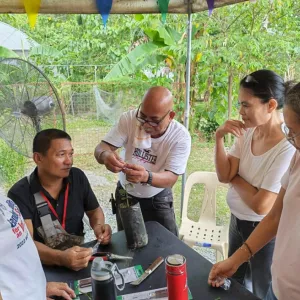Strengthening Food Systems in Quezon City through Perennial Vegetable Production Training for Urban Farmers
Participants Engaged in Hands-On Learning of Grafting Techniques/Photo- International Institute of Rural Reconstruction (IIRR) On August 5, 2025, the CGIAR Food Frontiers and Security Program and the International Institute of Rural Reconstruction (IIRR), in partnership with the Quezon City Local Government Unit and the Institute of Plant Breeding of the University of the Philippines Los Baños, conducted a Perennial

Strengthening Food Systems in Quezon City through Perennial Vegetable Production Training for Urban Farmers
Participants Engaged in Hands-On Learning of Grafting Techniques/Photo- International Institute of Rural Reconstruction (IIRR)
On August 5, 2025, the CGIAR Food Frontiers and Security Program and the International Institute of Rural Reconstruction (IIRR), in partnership with the Quezon City Local Government Unit and the Institute of Plant Breeding of the University of the Philippines Los Baños, conducted a Perennial Vegetable Production Training for 41 urban farmers—including 29 women and 12 men—in Quezon City, Philippines.
The training aimed to strengthen the knowledge and practical skills of urban farmers by highlighting the ecological and agricultural benefits of integrating perennial vegetables into urban gardens. Core topics included the design and management of sustainable nurseries, various propagation techniques (seed, cutting, grafting, and budding), integrated pest and disease management, and water and soil conservation practices tailored specifically for urban environments.

Participants Engaged in Hands-On Learning of Grafting Techniques/ Photo-International Institute of Rural Reconstruction (IIRR)
To reinforce the farmers’ ability to implement climate-resilient agricultural practices, the training combined theoretical learning with hands-on application. Modules covered included: an introduction to perennial vegetables, soil preparation and fertilization, nursery establishment and maintenance, integrated pest and disease control, and both sexual and asexual propagation methods. Practical exercises enabled participants to apply propagation and soil preparation techniques using locally available materials.
Participants expressed appreciation for the experiential approach, with one farmer noting that the grafting session significantly enhanced their skills beyond what they had learned from online videos. By the end of the training, participants were well-equipped to establish and manage community-based nurseries—contributing to sustainable food systems and strengthening the future of urban agriculture in their communities.

Participants, Resource Persons, and Facilitators during the training/Photo- International Institute of Rural Reconstruction (IIRR)
Authors: Doreen Kimayong and Arma Bertuso

